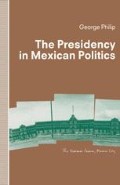Abstract
‘Echeverría was a better President than I; he knew how to choose his successor’. Díaz Ordaz, and many other Mexicans, saw the Echeverría administration as marking a complete departure from that of his predecessor. To some extent it was. Anybody listening to Díaz Ordaz cursing, Lear-like, his ungrateful putative son, might have believed that the two men were poles apart. However in some ways, notably in their belief in a fairly extreme form of presidentialism, they had more in common than either cared to admit.
Access this chapter
Tax calculation will be finalised at checkout
Purchases are for personal use only
Preview
Unable to display preview. Download preview PDF.
Notes
Latin America accepted Echeverría’s version of events at the time. So did J.A. Hellman, Mexico in Crisis. (2nd edn., Holmes & Meier, 1983).
G. Zaid, La Economía Presidencial (Vuelta, 1988) pp. 37–8.
P. Smith, Labyrinths of Power; J. Bailey, Governing Mexico; the Statecraft of Crisis Management (Macmillan, 1988). Bailey, normally an extremely cautious commentator, nevertheless believes that ‘Echeverría sought a personal confidant who was a competent administrator and a weak politician. Echeverría’s likely project was to extend his influence into the successor’s terms, to create a minimato’. (p.38).
Loaeza, Clases Medias. See also Samuel Schmidt, El Deterioro del Presidencialismo Mexicano: Los Anos de Luis Echeverría (Eclamex, 1986).
Saul Trejo Reyes, El Futuro de la Politica Industrial en México (Colegio de México, 1987).
Alan Knight, ‘The Political Economy of Revolutionary Mexico’, pp. 288–318 of C. Abel and C. Lewis, Latin America: Economic Imperialism and the State. (ILAS, London, 1985) p. 306.
John Heath, ‘An Overview of the Mexican Agricultural Crisis’, pp. 129–64 of George Philip, ed., The Mexican Economy (Routledge, 1988).
S. Sanderson, The Transformation of Mexican Agriculture (Princeton University Press, 1986).
R. Looney, Economic Policymaking in Mexico; Factors underlying the 1982 Crisis (Duke University Press, 1985).
Dale Story, Industry, The State and Public Policy in Mexico (University of Texas, 1986).
For a study of Mexican policy toward foreign investment see R. Ramírez de la O, De la Improvisación al Fracaso; La politica de inversión extranjera en México (Oceano, 1983).
W. Van Ginnekin, Socio-Economic Groups and Income Distribution in Mexico (Croom Helm, 1980).
E.V.K. Fitzgerald, ‘State and Capital Accumulation; Mexico 1940–82’ p.215 in C. Anglade and C. Fortin, eds, The State and Capital Accumulation in Latin America; Brazil, Chile and Mexico. (Macmillan, 1985); Schmidt, El Deterioro de Presidencialismo.
J. Brannon and E. Baklanoff, Agrarian Reform and Public Enterprise in Mexico; The Political Economy of Yucatán’s Henequen Industry (University of Alabama, 1987).
M. Basáñez, La Lucha por la Hegemonía en Mexico (Siglo XXI, 1980) provides evidence that high-level figures within the system were calling for a leftward readjustment in policy to follow Diaz Ordaz.
R. Enríquez, ‘The Rise and Collapse of Stabilising Development’ in G. Philip, The Mexican Economy (Routledge, 1985) Schmidt, El Deterioro del Presidencialismo Mexicano.
R. Miliband, The State in Capitalist Society (Weidenfeld & Nicolson, 1969).
C. Tello, La Politica Economica en México 1970–76 (Siglo XXI, 1979).
P. Cleaves, Professions and the State; the Mexican Case. (University of Arizona, 1987).
C. Clapham, Third World Politics (Croom Helm, 1985).
R.D. Hansen, The Politics of Economic Growth in Mexico (Johns Hopkins, 1974).
P. Ward, Welfare Politics in Mexico; Papering over the Cracks (Allen & Unwin, 1985).
M. Basáñez, ‘Viente Años de Crisis en México’ (Unpublished, 1989). Part 2.
M.Basânez, La Lucha Por La Hegemonía en México. (Siglo XXI, 1981). Echeverría did in fact, set up a new tripartite body in 1971 to discuss various themes with labour and the private sector. However the private sector did not feel that its expressed views carried any weight. See I. Morales et al, La Formación de la Politica Petrolera en México, 1970–86 (Colegio de México, 1988) p.44.
L.A. Whitehead, ‘Mexico: From Bust to Boom’ World Development 1980, p. 846.
George Philip, Oil and Politics in Latin America; Nationalist Movements and State Companies (Cambridge University Press, 1982).
L. Meyer, ‘Debilidad de la Fuerza’ in Excelsior, 25 January 1984.
See the article by James Goodsell in Christian Science Monitor, 16 December 1974.
M. Basañez et al. ,La Composición del Poder: Oaxaca (INAP, 1987) p. 101.
Ian Roxborough, Unions and Politics in Mexico; the case of the automobile industry (Cambridge University Press, 1984).
For a discussion of unionisation within Pemex see Peter Cleaves, Professions and the State; the Mexican Case (University of Arizona, 1987).
L. Arizpe, ‘The State and Uneven Urban Development in Mexico’ in G.Philip, ed., Politics in Mexico (Croom Helm, 1985).
B. Moore, Social Origins of Dictatorship and Democracy: Lord and Peasant in the Making of the Modern World (Beacon Press, 1966);
S.P. Huntington, Political Order in Changing Societies (Yale University Press, 1968).
For a discussion on a series of incidents in 1957–8, see D. Mares, Penetrating the International Market: Theoretical Considerations and a Mexican Case Study (Columbia University Press, 1987);
S. Sanderson, Agrarian Populism and the Mexican State (University of California, 1981).
R. Michaels, ‘The Crisis of Cardenismo’, Journal of Latin American Studies, vol. 2 (1970).
Daniel Levy, University and Government in Mexico; Autonomy in an Authoritarian System (Praeger, 1980), suggests that Echeverria was far less controlling of university politics than was Diaz Ordaz. For a rather different emphasis see ‘Mexico: conflict on the campus’ (Latin America 11, August 1972).
Author information
Authors and Affiliations
Copyright information
© 1992 George Philip
About this chapter
Cite this chapter
Philip, G. (1992). From Counter-Insurgency to Economic Crisis: the Echeverría Presidency. In: The Presidency in Mexican Politics. St Antony’s. Palgrave Macmillan, London. https://doi.org/10.1007/978-1-349-12192-2_3
Download citation
DOI: https://doi.org/10.1007/978-1-349-12192-2_3
Publisher Name: Palgrave Macmillan, London
Print ISBN: 978-1-349-12194-6
Online ISBN: 978-1-349-12192-2
eBook Packages: Palgrave History CollectionHistory (R0)

